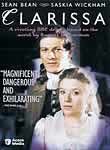Movie: Clarissa (C, H, W)
 Clarissa is a Masterpiece Theatre version of Samuel Richardson's classic novel by the same name. Clarissa is a virtuous young woman facing pressure from every side. Her family wants her to marry one man; the villainous Lovelace (Sean Bean) is determined to seduce her; and Clarissa herself (who has just inherited a fortune) want to remain unmarried in order to retain her independence.
Clarissa is a Masterpiece Theatre version of Samuel Richardson's classic novel by the same name. Clarissa is a virtuous young woman facing pressure from every side. Her family wants her to marry one man; the villainous Lovelace (Sean Bean) is determined to seduce her; and Clarissa herself (who has just inherited a fortune) want to remain unmarried in order to retain her independence.To escape the forced marriage, she runs away with Lovelace. By conspicuously keeping separate rooms, she manages to preserve her reputation (at least in her own mind), but discovers in Lovelace a disconcerting mixture of charm and brutality. Her family refuses to send her money or clothing, Lovelace continues to plot against her, and she finds herself virtually imprisoned in a brothel.
Letter-writing plays a prominent role in the film. Clarissa constantly writes letters, first to Lovelace (before he reveals himself as an utter villain), and then to her family and her best friend (Hermione Norris). These letters are viewed by everyone as dangerous and subversive because they represent her independent will and attempt at personal agency. Clarissa's letters are destroyed, copied, stolen, or ignored, yet she continues to write them in order to try to solve her problem without compromising her own values and desires.
Clarissa is a moral woman, pure and good without being self-righteous or saccharine-sweet. After watching the film, I'm eager to read the book. I am curious to see if the original novel is as supportive of female independence as the film. Grade: A






